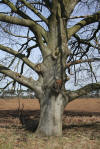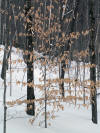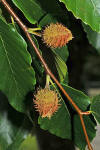WILD
FOODIES' HOME PAGE
PLANT PROFILE LIST
NAME: American Beech
SPECIES / FAMILY: Fagus Grandifolia / Fagaceae
OTHER COMMON NAME(S):
CONDITIONS: full
sun
|
PARTS: |
EDIBLE |
TASTE |
RAW/COOK |
SEASON |
|
All |
|
|
|
|
|
Shoots |
|
|
|
|
|
Leaves |
|
mild |
RAW/DRY/COOK |
Spring |
|
Stalk/Stem |
|
|
|
|
|
Buds |
||||
|
Flowers |
|
|
|
|
|
Fruits |
|
|
|
|
|
Pods |
|
|||
|
Seeds |
|
|
|
|
|
Nuts |
|
|
RAW/COOK/ROAST |
Fall |
|
Roots |
|
|
|
|
|
Bark |
|
|
DRY/GRIND/COOK |
|
PORTION: small
COMMENT: People frequently carve their initials on the smooth bark of Beech trees, and those initials can last the lifetime of the tree! As opposed to writing your name in the sand at the "beach" where it can easily get washed away. Got it? That's how I remember the name of the Beech tree. And in the winter, young Beech trees stand out because they keep their golden leaves. // Inner bark; Leaves; Seed/Nuts/Mast. Young leaves - raw or cooked as a potherb. A very nice mild flavour but the leaves quickly become tough so only the youngest should be used. New growth is usually produced for 2 periods of 3 weeks each year, one in spring and one in mid-summer. Seed - raw or cooked. Small but very sweet and nutritious, it is sold in local markets in Canada and some parts of America. It can be dried and ground into a powder, then used with cereal flours in making bread, cakes etc. The germinating seeds can be eaten raw, they are tender, crisp, sweet and nutty. The roasted seed is a coffee substitute. An edible semi-drying oil is obtained from the seed. Inner bark - Dried, ground into a powder and then used as a thickening in soups etc or mixed with cereals when making bread.(1) Beech nuts are edible to humans, although too small to be commercially valuable.(3) Inner bark is edible, young leaves edible, mature seeds (best to remove their brown covering.) Can be roasted and or made into a nut butter. The oil is good for cooking.(2)
Beech trees begin producing seeds around 40-years old! By 60, Beech trees can be producing huge amounts of seeds. They donít produce every year and can cycle anywhere from two to eight years.(2)
CAUTION: The raw seed should not be eaten in large quantities since it is believed to cause enteritis.(1) Enteritis: Inflammation of the intestines, generally the small intestine, that may lead to diarrhea. (American Heritage Dictionary)
NUTRITION/MEDICINAL: Rich in oil, the seed also contains up to 22% protein. Pectoral; Skin; Vermifuge. A decoction of the boiled leaves has been used as a wash and poultice to treat frostbite, burns, poison ivy rash etc. The nuts have been eaten as a vermifuge. A tea made from the bark has been used in the treatment of lung ailments. It has also been used to procure an abortion when the mother was suffering.(1)
LOOK-A-LIKES:
POISONOUS LOOK-A-LIKES:
OTHER USES: Charcoal; Oil; Wood. The oil obtained from the seed has been used as a fuel in oil lamps. Wood - strong, hard, heavy, very close grained, not durable, difficult to cure. Harvested commercially, it is used for furniture, flooring, tool handles, crates etc. It makes an excellent charcoal and is used in artwork.(1)
SOURCE LINKS (may include nutritional and medicinal info, plus other uses):
- https://pfaf.org/user/Plant.aspx?LatinName=Fagus+grandifolia
- http://www.eattheweeds.com/the-all-american-beech
- https://en.wikipedia.org/wiki/Fagus_grandifolia
- https://www.gardensall.com/beech-tree-uses-and-benefits/
- https://practicalselfreliance.com/foraging-beech-nuts
- https://www.knowledge-to-forage.com/beech-tree-foraging-and-medicinal-herbalism
- https://www.wildfoodie.co.uk/post/beech-tree-and-beechnuts
- https://treefluent.com/can-you-eat-beech-trees
- https://greg.app/american-beech-edible
- https://treefluent.com/are-beech-tree-leaves-edible
-
https://www.eatweeds.co.uk/beech-fagus-sylvatica






